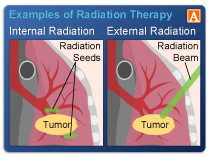- You are here:
- Home »
- Blog »
- Uncategorized »
- Prostate Cancer Treatment Side Effects- Radiation Fibrosis
Prostate Cancer Treatment Side Effects- Radiation Fibrosis

“There is a risk of serious complications developing after radiation treatment (radiotherapy) for prostate cancer (late radiation tissue injury (LRTI)).”
Dear Cancer Coach-About six weeks ago I completed a 28-session of IMRT radiation treatment for aggressive prostate cancer that was viewed by the doctors as still being localized within the prostate. Post-treatment I had the usual side-affects– bladder and intestine emptying events coupled with fatigue.
I also began having what appeared to be muscle ache-pain in my right buttocks cheek and right hip area. It has become progressively worse; when I walk the pain with each step is akin to getting hit with a baseball bat. I get occasional waves of nausea which I just live with until they go away.
About three weeks ago I underwent brachyotherapy, radioactive seed implantation of the prostate. Since that procedure I have been experiencing the same pain mentioned above, except more intense.
I’m taking the heavy duty arthritis OTC pills (625 mg variety) which do reduce the pain somewhat.
I’ve tried electrical stimulation of the sore areas with no noticeable results. Earlier today it seemed as though the treatment exacerbated the pain.
During a search for probable causes I literally stumbled upon the term “radiation fibrosis” (RF). Some of the presented symptoms of RF match what I’m going through.
IF I do have RF, I’d appreciate any advice and counsel you could provide. Being an active individual encumbered with this pain is a big downer.. can’t do 25% of what I normally do. Frustrating. And, no, none of the folks in the radiology department, or my urologists, advised me about the potential pain.
Thank you in advance for whatever assistance you can render. Sincerely, Fred
Dear Fred,
I am sorry to read of your radiation fibrosis. Several things. First and foremost, I believe that your best chance at healing radiation fibrosis are:
- Hyperbaric Oxygen Therapy aka HBOT-
- Acupuncture
Depending on where you live, there will be clinics near by. Maybe even a hospital that provides this therapy. The best thing going for you right now is the fact that your radiation (damaging therapy) was reasonably recently. Weeks is recent. Months or years is not. Don’t wait.
Just as important, if your M.D. oncologist, medical professional will write you a perscription for HBOT, your insurance should pay for it.
Let me know if you have any questions. Good luck,
David Emerson
- Cancer Survivor
- Cancer Coach
- Director PeopleBeatingCancer
Recommended Reading
- Nerve damage aka “Radiation-Induced Lumbosacral Plexopathy” therapies-
- Radiation-induced Plexopathy, Radiculopathy or Myelopathy?
- Radiation Fibrosis- collateral damage- reduce, prevent, heal
Hyperbaric oxygen therapy for the treatment of the late effects of radiotherapy
“There is a risk of serious complications developing after radiation treatment (radiotherapy) for cancer (late radiation tissue injury (LRTI)). These problems can be very difficult to resolve and there is some doubt as to the best approaches to treatment. Hyperbaric oxygen therapy (HBOT) involves breathing oxygen in a specially designed chamber. It is used as a treatment to improve oxygen supply to damaged tissue (cells within the body) and support healing.
The aim of the review
We searched medical databases for clinical studies aimed to find the evidence for or against the ability of HBOT, compared to either no treatment or alternative treatments, to improve these complications. The evidence was current to December 2015.
What were the main findings?
There was some evidence that HBOT improved outcome in LRTI affecting bone and soft tissues of the head and neck, for radiation proctitis (inflammation of the lower part of the large intestine caused by radiotherapy treatment) and to prevent the development of osteoradionecrosis (bone death caused by radiotherapy treatment) following tooth extraction in an irradiated field. There was no such evidence of any important clinical effect on tissues in the nervous system.
Quality of the evidence
The evidence was generally of moderate quality and limited by small numbers of participants, poor reporting of methods and results, and uncertainty as to the exact degree of improvement with HBOT.
What are the conclusions?
The application of HBOT to selected participants and tissues may be justified. Studies of radiation injury suggest that other tissues are also likely to respond (e.g. bladder). Further research is required to establish which people may respond and the best timing of such therapy. A study of costs would also be useful.”


